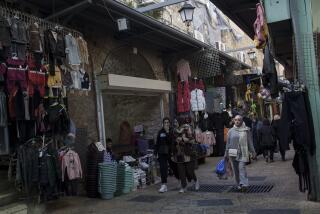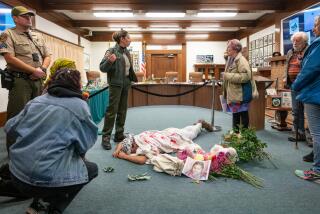In Mosul, Iraq, feared crackdown by militants has not materialized
For days, the northern Iraqi city of Mosul was flush with rumors of an imminent onslaught by Al Qaeda-inspired militants, prompting the mayor to appeal to “men who love death with honor” to mount a defense even as others fled.
When gunmen broke through the city’s perimeter on June 9 amid a hasty retreat by Iraqi police and army units, with the mayor joining the exodus, many who remained braced for the worst.
It came as somewhat of a surprise when residents awoke the next day to a city not under a harsh form of sharia, or Islamic law, imposed by foreign extremists, but one whose government offices were staffed in part by Iraqis allied with the insurgents against a Shiite Muslim-led central government that has little support among Mosul’s Sunni Muslim majority.
The question, based on the militants’ actions in neighboring Syria, is how long it will be before they begin to impose their hard-line interpretation of Islam on Mosul. If and when that happens, residents could turn against them, just as many Iraqis from Sunni Muslim areas soured on militants during the 2003-11 U.S. occupation.
Foreign reporters have not been able to enter Mosul because of security concerns, but reports from the city indicate it has returned to a semblance of normality despite shortages of water, electrical power and gasoline.
There has been relatively little looting, residents say, and those who took charge also swept away the government’s security checkpoints that had created a traffic nightmare on streets and bridges of the city, which is bisected by the Tigris River.
Almost two weeks after Mosul was overrun, interviews with more than a dozen residents and postings on their social media accounts indicated that the feared crackdown by the Islamic State of Iraq and Syria, or ISIS, on the city’s more than 1 million residents has not occurred. Many residents say they feel reassured so far by the behavior of the city’s new rulers, and some regard them as liberators.
But there is broad concern about what happens next.
The initial lack of overt interference in everyday life follows a pattern established in Syria, where ISIS thrived and expanded amid civil war. Its forces generally acted in a low-key fashion after taking towns such as Raqqah in north-central Syria, and Azaz, near the Turkish border.
In all cases ISIS’ hard-line approach soon became manifest, with public executions, crucifixions and a strict ban on smoking, alcohol and what the militants viewed as provocative female dress. Women were proscribed from appearing in public without a full body cloak and an accompanying male relative.
The militant group’s propaganda videos and supporters insist that its only target is the Iraqi government.
“People are no longer worried — there is no fear, no killing, the markets are full,” said Younes, a Mosul resident reached by phone who, like others interviewed, declined to give his family name for security reasons.
The black-clad Islamist fighters directing traffic and maintaining order are “good people” who prevent price-gouging by merchants eager to take advantage of the unstable situation, Younes said.
Many in Mosul seem to accept so far ISIS’ self-description as “liberators” determined to restore dignity to a mostly Sunni population largely hostile to the government of Prime Minister Nouri Maliki. Many Iraqi Sunnis view Maliki’s administration as a sectarian-driven entity that takes its orders from Iran and empowers Iraq’s Shiite majority while marginalizing Sunnis.
Iraqi state media have accused ISIS of burning churches and raping women, a charge denied by antigovernment activists, who insist on calling the fighters “revolutionaries.”
“There is no transgression against women in Mosul, and this is all lies by the media,” Ahmad Malaah, a cafe owner in Mosul, said on his Facebook page.
ISIS did act quickly and ruthlessly in certain circumstances. It’s accused of looting the city’s central bank of $420 million, of abducting the 49-member staff of the Turkish Consulate and of executing hundreds of mostly Shiite government security forces, reportedly by firing machine guns at them in a ditch or slitting their throats.
Residents said the militants also destroyed monuments to several local cultural icons.
Part of the relatively benign impression among residents to date may stem from relief over the departure of a government security apparatus that many viewed as an occupying force.
Another factor appears to be the emerging realization that ISIS forces, while leading last week’s sweep through northern and central Iraq, worked closely with a host of area collaborators: former supporters of Saddam Hussein’s Baath Party, disaffected Sunni tribesmen, former army officers and others, many apparently known in Mosul. The city was a Hussein stronghold and a hub of the bloody uprising against occupying U.S. troops.
In 2003, Hussein’s sons, Uday and Qusai, were killed in an hours-long shootout with U.S. forces in Mosul.
Over the course of the U.S. occupation, some Sunni tribal groups in western Iraq turned on their extremist allies. A number of sheiks and their followers, including former insurgents who had fought the Americans, agreed to go on the U.S. payroll to battle the militants.
Some credit this “awakening” movement with helping to defeat the militants and bring a tenuous peace to Iraq. Others argue that it ultimately exacerbated tensions. Maliki’s government viewed these Sunni groups with suspicion, and many are thought to have now joined the ISIS-led insurgency.
In 2008, Mosul saw a large-scale exodus of its ancient Assyrian Christian population after a dozen people were slain, including the Chaldean Catholic archbishop, and others were warned to convert to Islam or be killed.
Today, however, accounts from Mosul indicate that even minorities such as Christians and members of the ancient Yazidi sect, which has ties to Zoroastrianism, have yet to face wholesale repression.
Christian clerics, while acknowledging their congregation remains unharmed, are worried, especially after the desecration of churches by Islamist fighters in Syria. In Raqqah, those Christians who remain have been forced to pay a special tax.
“They [Christians] are fine, although they fear what lies ahead,” said Bishop John Matti, speaking by phone from the Nineveh plains outside Mosul to which many Christians from the city have fled.
With its resources stretched thin as it continues to seize territory, ISIS may not have enough people to bring its vision of an Islamic caliphate to Mosul. Reliance on local allies helps explain how a much larger government security force was routed so thoroughly during ISIS’ advance this month.
Among the disaffected Sunni groups said to be allied with ISIS in Mosul is a faction composed of ex-Baathist apparatchiks known as the Naqshbandi Army, or JRTN, its Arabic acronym. It was the JRTN, ostensibly led by Hussein’s vice president, Izzat Ibrahim, whose whereabouts remain unknown, that deployed its men early to protect the city’s banks, according to residents.
Members of the group reportedly plastered posters referring to Saddam Hussein as a “martyr” and hailing Mosul’s “liberation.” The Baathist offshoot has also reportedly appointed two Iraqi officers from the Hussein era to act as the city’s governors.
There are some indications lately that ISIS may be gearing up to impose a harder ideological line in Mosul.
It has reportedly made good on its vow to do away with “idolatry,” bulldozing monuments to several cultural figures including Abu Tammam, an acclaimed 9th century poet.
The destruction of the city’s cultural heritage prompted one resident, Jamal Faisa Rawy, to predict on Facebook that Mosul residents would eventually rue the day when they cheered the militants who overran the ancient city.
Said Rawy: “We’ll lament and wish for the days of Maliki and his fragile army that we let down.”
Bulos is a special correspondent. Times staff writers Patrick J. McDonnell in Beirut and Raja Abdulrahim in Los Angeles contributed to this report.
More to Read
Start your day right
Sign up for Essential California for news, features and recommendations from the L.A. Times and beyond in your inbox six days a week.
You may occasionally receive promotional content from the Los Angeles Times.







